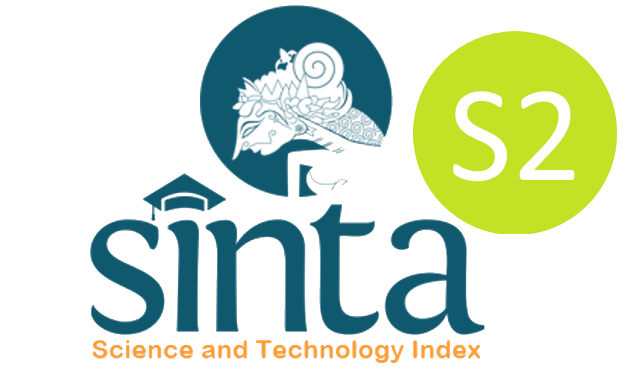Abstract
Teaching requires the fulfillment of multiple roles, including enhancing instructional practices, fostering student learning, serving as a role model, and collaborating with colleagues while adapting to the new curriculum, Kurikulum Merdeka. Consequently, teacher engagement is essential for improving teacher performance. Engaged teachers also experience better well-being and are less likely to face mental health challenges. According to the Job-Demands Resource Model, mindfulness in teaching and teacher resilience can be regarded as personal resources that foster teacher engagement. This study aims to investigate the relationship between mindfulness in teaching, teacher resilience, and teacher engagement. A total of 417 Indonesian teachers participated in this study by completing the three standardized scales: Mindfulness in Teaching Scale, Multidimensional Teacher Resilience Scale, and Engaged Teacher Scale. The result indicates a significant positive relationship between mindfulness in teaching and teacher engagement, fully mediated by teacher resilience. Mindfulness in teaching enhanced teacher resilience, which, in turn, fostered teacher engagement. These findings highlight the crucial role of mindfulness in teaching as a personal resource that enables teachers to navigate challenges and maintain engagement through improved resilience. The study emphasizes the importance of incorporating mindfulness practices into teachers’ daily lives to support them in their multifaceted roles.
References
Alam, S. (2023, December 18). Hasil PISA 2022, refleksi Mutu pendidikan nasional 2023. Media Indonesia. https://mediaindonesia.com/opini/638003/hasil-pisa-2022-refleksi-mutu-pendidikan-nasional-2023
Alawiyah, F. (2017). Standar nasional pendidikan dasar dan menengah. Aspirasi: Jurnal Masalah-Masalah Sosial, 8(1), 81–92. https://doi.org/10.46807/aspirasi.v8i1.1256
Badan Standar, K., & Pendidikan, A. (2022). Tahapan implementasi kurikulum Merdeka di Satuan pendidikan. Kementerian Pendidikan, Kebudayaan, Riset, dan Teknologi
Bakker, A. B., & Bal, M. P. (2010). Weekly work engagement and performance: A study among starting teachers. Journal of Occupational and Organizational Psychology, 83(1), 189–206. https://doi.org/10.1348/096317909X402596
Bakker, A. B., & Demerouti, E. (2017). Job demands–resources theory: Taking stock and looking forward. Journal of Occupational Health Psychology, 22(3), 273–285. https://doi.org/10.1037/ocp00000566
Basikin,B. (2007). Vigor, dedication and absorption: Work engagement among secondary school English teachers in Indonesia. In Annual AARE Conference (pp. 1–18). Fremantle, Perth, Western Australia
Benekos, P. J. (2016). How to be a good teacher: Passion, person, and pedagogy. Journal of Criminal Justice Education, 27(2), 225–237. https://doi.org/10.1080/10511253.2015.1128703
Bi, Y., & Ye, X. (2021). The effect of trait mindfulness on teachers’ emotional exhaustion: The chain mediating role of psychological capital and job engagement. Healthcare, 9(11), 1527. https://doi.org/10.3390/healthcare9111527
Braun, S. S., Roeser, R. W., Mashburn, A. J., & Skinner, E. (2019). Middle school teachers’ mindfulness, occupational health and well-being, and the quality of teacher-student interactions. Mindfulness, 10(2), 245–255. https://doi.org/10.1007/s12671-018-0968-2
Daniilidou, A., & Platsidou, M. (2018). Teachers’ resilience scale: An integrated instrument for assessing protective factors of teachers’ resilience. Hellenic Journal of Psychology, 15, 15–39
Day, C., & Hong, J. (2016). Influences on the capacities for emotional resilience of teachers in schools serving disadvantaged urban communities: Challenges of living on the edge. Teaching and Teacher Education, 59, 115–125. https://doi.org/10.1016/j.tate.2016.05.015
Duncan, L. G., Coatsworth, J. D., & Greenberg, M. T. (2009). A model of mindful parenting: Implications for parent-child relationships and prevention research. Clinical Child and Family Psychology Review, 12(3), 255–270. https://doi.org/10.1007/s10567-009-0046-3
Easterly, R. G., & Myers, B. E. (2018). Personal resilience as a predictor of professional development engagement and career satisfaction of agriscience teachers. Journal of Agricultural Education, 59(1), 119–134. https://doi.org/10.5032/jae.2018.01119
Flook, L., Goldberg, S. B., Pinger, L., Bonus, K., & Davidson, R. J. (2013). Mindfulness for teachers: A pilot study to assess effects on stress, burnout and teaching efficacy. Mind, Brain and Education, 7(3), 182–195. https://doi.org/10.1111/mbe.12026
Flores-Buils, R., Caballer-Miedes, A., & Mateu-Pérez, R. (2022). Resilience in teachers: Validation of the Spanish version. International Journal of Environmental Research and Public Health, 19(17), 11020. https://doi.org/10.3390/ijerph191711020
Frank, J. L., Jennings, P. A., & Greenberg, M. T. (2016). Validation of the mindfulness in teaching scale. Mindfulness, 7(1), 155–163. https://doi.org/10.1007/s12671-015-0461-0
Grover, S. L., Teo, S. T. T., Pick, D., & Roche, M. (2017). Mindfulness as a personal resource to reduce work stress in the job demands‐resources model. Stress and Health, 33(4), 426–436. https://doi.org/10.1002/smi.2726
Gu, Q., & Day, C. (2013). Challenges to teacher resilience: Conditions count. British Educational Research Journal, 39(1), 22–44. https://doi.org/10.1080/01411926.2011.623152
Halawa, F., Anggraini, E. N., & Yulianti, P. (2023). The antecedents and consequences of work engagement on teacher: A systematic literature review. Maker: Jurnal Manajemen, 9(1), 27–38. https://doi.org/10.37403/mjm.v9i1.536
Hayes, A. F. (2018). Introduction to Mediation, Moderation, and Conditional Process Analysis: A Regression-Based Approach 2nd ed. Guilford Press
Helmi, A. F., Widhiarso, W., Marvianto, R. D., Priwati, A. R., Mustari, M. A., & Artikasari, Y. V. (2020). The fourth dimensions of the job demands-resources (JD-R) model of work engagement in Indonesian context. Jurnal Psikologi, 47(3), 206. https://doi.org/10.22146/jpsi.56682
Heng, Q., & Chu, L. (2023). Self-efficacy, reflection, and resilience as predictors of work engagement among English teachers. Frontiers in Psychology, 14, 1160681. https://doi.org/10.3389/fpsyg.2023.1160681
Kabat-Zinn, J. (2003). Mindfulness-based interventions in context: Past, present, and future. Clinical Psychology: Science and Practice, 10(2), 144–156. https://doi.org/10.1093/clipsy/bpg016
Khairani, R. N., Cahyadi, S., & Susanto, H. (2021). Studi validitas dan reliabilitas mindfulness in teaching scale Indonesia. Jurnal Kependidikan: Jurnal Hasil Penelitian Dan Kajian Kepustakaan di Bidang Pendidikan, Pengajaran Dan Pembelajaran, 7(1), 55. https://doi.org/10.33394/jk.v7i1.3296
Klassen, R. M., Aldhafri, S., Mansfield, C. F., Purwanto, E., Siu, A. F. Y., Wong, M. W., & Woods-McConney, A. (2012). Teachers’ engagement at work: An international validation study. The Journal of Experimental Education, 80(4), 317–337. https://doi.org/10.1080/00220973.2012.678409
Klassen, R. M., Yerdelen, S., & Durksen, T. L. (2013). Measuring teacher engagement: Development of the Engaged Teachers Scale (ETS). Frontline Learning Research, 1(2), 33–52. https://doi.org/10.14786/flr.v1i2.44
Konermann, J. (2012). Teachers’ work engagement: A deeper understanding of the role of job and personal resources in relationship to work engagement, its antecedents, and its outcomes [PhD, University of Twente]. https://doi.org/10.3990/1.9789036533027
Kowitarttawatee, P., & Limphaibool, W. (2022). Fostering and sustaining teacher resilience through integration of Eastern and Western mindfulness. Cogent Education, 9(1), 1–15. https://doi.org/10.1080/2331186X.2022.2097470
Kristiana, I. F., Ardi, R., & Hendriani, W. (2018). What’s behind work engagement in teaching practice? In Proceedings of the 3rd International Conference on Psychology in Health, Educational, Social, and Organizational Settings (pp. 267–275). SCITEPRESS - Science and Technology Publications. https://doi.org/10.5220/0008588102670275
Malinowski, P., & Lim, H. J. (2015). Mindfulness at work: Positive affect, hope, and optimism mediate the relationship between dispositional mindfulness, work engagement, and well-being. Mindfulness, 6(6), 1250–1262. https://doi.org/10.1007/s12671-015-0388-5
Mansfield, C. F., Beltman, S., Price, A., & McConney, A. (2012). ‘Don’t sweat the small stuff:’ understanding teacher resilience at the chalkface. Teaching and Teacher Education, 28(3), 357–367. https://doi.org/10.1016/j.tate.2011.11.001
Mansfield, C. F., Beltman, S., Weatherby-Fell, N., & Broadley, T. (2016). Classroom ready? Building resilience in teacher education. In R. Brandenburg, S. McDonough, J. Burke, & S. White (Eds.), Teacher Education (pp. 211–229). Springer: Singapore. https://doi.org/10.1007/978-981-10-0785-9_13
Moyano, N., Perez-Yus, M. C., Herrera-Mercadal, P., Navarro-Gil, M., Valle, S., & Montero-Marin, J. (2023). Burned or engaged teachers? The role of mindfulness, self-efficacy, teacher and students’ relationships, and the mediating role of intrapersonal and interpersonal mindfulness. Current Psychology, 42(14), 11719–11732. https://doi.org/10.1007/s12144-021-02433-9
Nurshadrina, A., Widyasari, P., Septiana, E., Novara, A. A., & Irawan, N. A. R. (2023). Adaptation and psychometrics properties of multidimensional teachers resilience scale Indonesian version (MTRS-I). Jurnal Kependidikan: Jurnal Hasil Penelitian Dan Kajian Kepustakaan di Bidang Pendidikan, Pengajaran Dan Pembelajaran, 9(4). https://doi.org/10.33394/jk.v9i4.9392
Peraturan Menteri Pendidikan, K., Riset, & Teknologi. (Permendikbudristek). Republik Indonesia 2022, No 3. https://jdih.kemdikbud.go.id/sjdih/siperpu/dokumen/salinan/salinan_20220302_095313_Salinan_Permen_3_2022.pdf
Peixoto, F., Wosnitza, M., Pipa, J., Morgan, M., & Cefai, C. (2018). A multidimensional view on pre-service teacher resilience in Germany, Ireland, Malta and Portugal. In M. Wosnitza, F. Peixoto, S. Beltman, & C. F. Mansfield (Eds.), Resilience in Education (pp. 73–89). Springer International Publishing. https://doi.org/10.1007/978-3-319-76690-4_5
Pianta, R. C., Hamre, B. K., & Allen, J. P. (2012). Teacher-student relationships and engagement: Conceptualizing, measuring, and improving the capacity of classroom interactions. In S. L. Christenson, A. L. Reschly, & C. Wylie (Eds.), Handbook of Research on Student Engagement (pp. 365–386). Springer: US. https://doi.org/10.1007/978-1-4614-2018-7_17
Rahmadani, A. (2017). Peran mediasi teacher engagement terhadap hubungan self-efficacy dalam Praktik Inklusif dan manajemen kelas: Studi terhadap guru sekolah dasar Inklusif Se-DKI Jakarta [Tesis]. Universitas Indonesia
Rahmadani, A., & Kurniawati, F. (2021). Teacher engagement mediates self-efficacy and classroom management: Focus on Indonesian primary schools. Electronic Journal of Research in Education Psychology, 19(53), 75–92. https://doi.org/10.25115/ejrep.v19i53.3444
Roeser, R. W., Skinner, E., Beers, J., & Jennings, P. A. (2012). Mindfulness training and teachers’ professional development: An emerging area of research and practice. Child Development Practices, 6(2), 167–173. https://doi.org/10.1111/j.1750-8606.2012.00238.x
Roth, G., Assor, A., Kanat-Maymon, Y., & Kaplan, H. (2007). Autonomous motivation for teaching: How self-determined teaching may lead to self-determined learning. Journal of Educational Psychology, 99(4), 761–774. https://doi.org/10.1037/0022-0663.99.4.761
Russ, S. W., & Wallace, C. E. (2013). Pretend play and creative processes. American Journal of Play, 6(1), 136–148
Safitri, A. (2020). Eprints UNM. Peranan pusat kegiatan belajar mengajar (PKBM) untuk menanamkan nilai-nilai karakter dalam masyarakat di Desa Bonde Kec. Cam Palagian Kab. Polewali Mandar [S1 Thesis, Universitas Neger Makassar]. https://eprints.unm.ac.id/18106/1/PERANAN%20PUSAT%20KEGIATAN%20BELAJAR%20MASYARAKAT%28JUR%29.pdf
Salmela-Aro, K., Hietajärvi, L., & Lonka, K. (2019). Work burnout and engagement profiles among teachers. Frontiers in Psychology, 10, 2254. https://doi.org/10.3389/fpsyg.2019.02254
Schaufeli, W. B., & Bakker, A. B. (2004). Job demands, job resources, and their relationship with burnout and engagement: A multi-sample study. Journal of Organizational Behavior, 25(3), 293–315. https://doi.org/10.1002/job.248
Schaufeli, W. B., Salanova, M., González-romá, V. G., & Bakker, A. B. (2002). The measurement of engagement and burnout: A two sample confirmatory factor analytic approach. Journal of Happiness Studies, 3(1), 71–92. https://doi.org/10.1023/A:1015630930326
Sibagariang, D., Sihotang, H., & Murniarti, E. (2021). Peran guru penggerak dalam pendidikan Merdeka Belajar di Indonesia. Dinamika Pendidikan, 14(2), 88–99. https://doi.org/10.51212/jdp.v14i2.53
Sofanudin, A., Prihastuti, R., & Diniyanto, A. (2021). Teachers engagement guru madrasah aliyah dalam pembelajaran di masa pandemi Covid-19. Jurnal Ilmiah Didaktika: Media Ilmiah Pendidikan dan Pengajaran, 21(2), 140–150. https://doi.org/10.22373/jid.v21i2.7975
Tao, W. (2022). Understanding the relationships between teacher mindfulness, work engagement, and classroom emotions. Frontiers in Psychology, 13, 993857. https://doi.org/10.3389/fpsyg.2022.993857
Troesch, L. M., & Bauer, C. E. (2019). Is teaching less challenging for career switchers? First and second career teachers’ appraisal of professional challenges and their intention to leave teaching. Frontiers in Psychology, 10, 3067. https://doi.org/10.3389/fpsyg.2019.03067
University of the People (2023). Why teachers are important in society-why teachers matter. University of the People. https://www.uopeople.edu/blog/the-importance-of-teachers/
Utami, P. T., & Hasanah, N. (2020). Good teacher, qualified teacher, and professional teacher: Facing the 21st century global changes. Ahmad Dahlan Journal of English Studies, 7(1), 55. https://doi.org/10.26555/adjes.v7i1.14531
Van Wingerden, J., & Poell, R. F. (2019). Meaningful work and resilience among teachers: The mediating role of work engagement and job crafting. PLOS One, 14(9), e0222518. https://doi.org/10.1371/journal.pone.0222518
Wosnitza, M., Peixoto, F., Silva, J. C., & Schwarze, J. (2016, April). Teacher resilience in Europe: A multidimensional view on a significant construct. AERA Conference 2016, Washington DC
Yerdelen, S., Durksen, T., & Klassen, R. M. (2018). An international validation of the engaged teacher scale. Teachers and Teaching, 24(6), 673–689. https://doi.org/10.1080/13540602.2018.1457024
Xie, F. (2021). A study on Chinese EFL teachers’ work engagement: The predictability power of emotion regulation and teacher resilience. Frontiers in Psychology, 12(735969), 1–12. https://doi.org/10.3389/fpsyg.2021.735969
Zhang, S., & Luo, Y. (2023). Review on the conceptual framework of teacher resilience. Frontiers in Psychology, 14, 1179984. https://doi.org/10.3389/fpsyg.2023.1179984
Recommended Citation
Nurshadrina, Amanda; Septiana, Eva; and Widyasari, Pratiwi
(2025)
"Mindfulness in Teaching and Teacher Engagement: The Mediating Role of Teacher Resilience,"
Psychological Research on Urban Society: Vol. 8:
No.
1, Article 3.
DOI: 10.7454/proust.v8i1.1172
Available at:
https://scholarhub.ui.ac.id/proust/vol8/iss1/3







